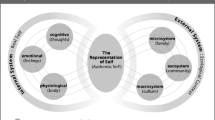Abstract
Successful health assessments are ongoing and rely on a clinician/client interaction, which is influenced by both the client’s and the clinician’s beliefs about their bodies. These beliefs about the human body arise out of religious and cultural contexts. Theories often explain cultural context by comparison of differences and similarities between the client and the clinician and/or between the client and the dominant culture. This approach can carry a bias inherent in the comparison to dominant beliefs held by those with the most power and economic advantage. The author suggests an existential approach in which client and clinician bodies interact each as adept, autonomous individuals with a conglomerate of beliefs about body and health.
Similar content being viewed by others
References
Administration on Aging (2001). Achieving Cultural Competence: A guidebook for providers of services to older Americans and their families [website]. AOA. Retrieved October 21:2004, from the World Wide Web: http://www.aoa.gov
Alvord L. A., Van Pelt E. C., (1999). The scalpel and the silver bear New York, NY Bantam Books
American Music Therapy Association (2004a). AMTA standards and competencies (AMTA member sourcebook) Silver Springs, MD AMTA
American Music Therapy Association (2004b). Moving forward with music therapy Austin, TX AMTA
American Psychological Association, (1990). APA Guidelines for Providers of Psychological Services to Ethnic, Linguistic, and Culturally Diverse Populations [website]. APA. Retrieved October 22:2004, from the World Wide Web: http://www.apa.org
Andrews M. A., Boyle J. S., (1999). Transcultural concepts in nursing care 3. Philadelphia, PA Lippincott Williams and Wilkins
Bear Heart, (1996). The wind is my mother New York, NY Berkley Books
Belar C. D., Deardorff W. W., (1995). Clinical health psychology in medical settings: A practitioner’s guidebook 2. Washington, DC American Psychological Association
Bonder B., Martin L., Miracle A., (2001). Achieving Cultural Competence: The Challenge for Clients and Healthcare Workers Generations 25(1):35–42
Bradt J., (2004). Ethical issues in multicultural music therapy Paper presented at the American Music Therapy Association National Conference Austin, TX
Chase K., (2003). Multicultual music therapy: A review of literature Music Therapy Perspectives 21(2):84–89
Darrow A.-A., Molloy D., (1998). Multicultural perspectives in music therapy Music Therapy Perspectives 16(1):27–33
Glucklich A., (2001). Sacred pain: Hurting the body for the sake of the soul New York, NY Oxford University Press
Guberman N., Maheu P., (2004). Beyond cultural sensitivity: Universal issues in caregiving Generations 27(4):39–43
HHS Office of Minority Health (2000). Assuring Cultural Competence in Health Care [website]. Agency for Healthcare Policy Research. Retrieved October 21:2004, from the World Wide Web: http://diversityrx.org
Krieger N., Smith G. D., (2004). “Bodies count,” and body counts: Social epidemiology and embodying inequality American Journal of Epidemiology 26(supp.):92–103
Moreno J., (1988). Multicultural music therapy: The world music connection Journal of Music Therapy 25(1):17–28
Purnell L. D., Paulanka B. J., (1998). Transcultural health care: A culturally competent approach Philadelphia, PA F.A. Davis Company
Strathern A. J., (1996). Body thoughts Ann Arbor, MI The University of Michigan
Sue S., (1998). In search of cultural competence in psychotherapy and counseling American Psychologist 53:440–448
Surgeon General (1999). Mental Health: Culture, race, and ethnicity [website]. U.S. Public Health Service. Retrieved November, 2004, from the World Wide Web: http://www.surgeongeneral.gov/library/mentalhealth/cre/execsummary
Thorne S., (1993). Health belief systems in perspective Journal of Advanced Nursing 18:1931–1941
Troppozada M.R., (1995). Multicultural training for music therapists: An examination of current issues Journal of Music Therapy 32(2):65–91
Turner B. S., (1996). The body and society: Explorations in social theory (2 ed.). Thousand Oaks, CA Sage Publications
Turner L., (2003). Bioethics and religions: Religious traditions and understandings of morality, health, and illness Health Care Analysis 11(3):181–197
Whitfield K. E., Weidner G., Clark R., Anderson N. B., (2002). Sociodemographic diversity and behavioral medicine Journal of Consulting and Clinical Psychology 70(3):463–481
Acknowledgments
The author wishes to acknowledge the advice of Dr. Gary Ebersole, Department of Religious Studies, University of Missouri-Kansas City, in preparing this paper.
Author information
Authors and Affiliations
Corresponding author
Additional information
The author is an Interdisciplinary PhD candidate in Music Therapy and Health Psychology at the University of Missouri-Kansas City Conservatory of Music. Her research goals include the interrelationship of music, spirituality, and cardiovascular health. She is a Board Certified music therapist and has served in that capacity since 1980 in mental health facilities, hospice, and private practice.
Rights and permissions
About this article
Cite this article
Metzger, L.K. An Existential Perspective of Body Beliefs and Health Assessment. J Relig Health 45, 130–146 (2006). https://doi.org/10.1007/s10943-005-9008-3
Published:
Issue Date:
DOI: https://doi.org/10.1007/s10943-005-9008-3




